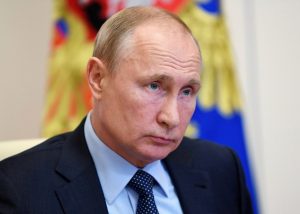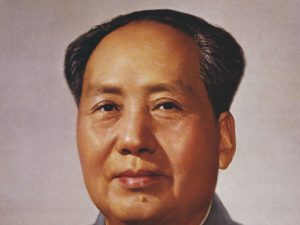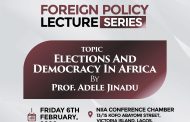Prof John Mearsheimer is not another pundit pontificating on war. He is in a class of his own. First, he is a graduate of the West Point Military Academy. Second, he ran up to the rank of a Col in the US Army before he went to read and to teach Political Science. Third, he is one of the few remaining established scholars of Neo-realism, one with a strong voice as in his book The tragedy of great power politics and his prediction of the inevitability of a clash between the US and China, the usual rising power/status quo power tension. But more than anything else, he is a signifier of the paradoxical hatred of war by (Neo) realists, the same set of scholars and practitioners who got the world into huge spending on nuclear arms. Nuclear arms is the practical side of deterrence theory. Historically, Realists as opposed to liberal internationalists (some of whom are members of the neocons) have opposed every war America has fought, from Vietnam to date. For these reasons, Intervention went for his reported interview (by Alex Lo of SCMP) after forth and back on whether it is worth reproducing. He cannot be ‘correct’ on everything he said but the principles he sets forth can be interesting. Enjoy the Interview
In an exclusive interview, John Mearsheimer tells ‘My Take’ the war will drag on, and any ceasefire will at best lead to ‘a cold peace’ with significant gains for Russia
John Mearsheimer, the R. Wendell Harrison Distinguished Service Professor of Political Science at the University of Chicago, has been described by The Atlantic magazine as one of the most famous critics of American foreign policy since the end of the Cold War.
Since the Russian invasion of Crimea in 2014, but especially the war in Ukraine more than a year ago, he has been providing cogent if controversial assessments of the conflict that has plunged the European Union into its deepest crisis.
In an interview with ‘My Take’, he offers a pessimistic assessment on the prospect for peace in Europe, the role of China in this conflict and its implications for Taiwan as a flashpoint in the intensifying rivalry between Beijing and Washington.

Historically rich and easy to read
His latest piece “The Darkness Ahead: Where The Ukraine War Is Headed” has been published independently in substack.com.
China is ‘big winner’ in Ukraine-Russia war, says leading US political scientist
What do you make of the aborted coup by the Wagner mercenary group, in terms of the power dynamics in Moscow and the war in Ukraine?
In the West, there was a lot of wishful thinking about the mutiny. A lot of people were hoping it would bring down (Vladimir) Putin or at least weaken him. This would allow Ukraine and the West to prevail over the Russians. But that did not happen. In fact, as a result of the mutiny, Putin’s position will be improved; he will be stronger.
The reason is that the existing relationship between the Wagner Group and (Yevgeny) Prigozhin in particular, on one side and the military on the other, was not a healthy relationship. There is no way you can run an army without a rational command structure. Prigozhin was something of a loose cannon. The end result is that Prigozhin had been dismissed and the Wagner Group was going to be placed under the command of the military. That would make the Russian military a more efficient fighting force.
It’s very important to remember that when you start a war, you are taking a peacetime army and you send them to do something that really hasn’t been done for a long time, which is to fight a war. And this is certainly true of the Russian army. There are going to be a lot of problems in the initial stages. But as the war wears on, those problems get solved. Then the military is, in a sense, rationalised. What happened with the Wagner Group is an example of a clunky military system being rationalised. The end result will be a more powerful Russian military, and all for the good from the Russian perspective.
Is a meaningful peace settlement between Ukraine and Russia possible?
There are some conflicts where you can imagine a peaceful settlement, but that’s not the case here. There is no solution and there are two major obstacles that make it almost impossible to have a meaningful peace agreement. I want to be clear here. Eventually, you will get some sort of a ceasefire that will turn into a cold conflict, but you are not going to get a meaningful peace agreement.
There are two reasons here: One has to do with the issue of territory, the other has to do with neutrality. The Russians have now taken a substantial portion of Ukrainian territory and they have formally annexed this territory to Russia and they have made it clear they have no intention of giving it back to Ukraine. Understandably, the Ukrainians find this unacceptable. They want their territory back, and they are willing to fight and die to get their territory back.
The problem is that you can’t solve the difference over territory between Russia and Ukraine because either Russia keeps the territory or Ukraine gets the territory. There is no way you can square that circle.
The other intractable issue is neutrality. The Russians are deeply committed to making sure that Ukraine is not a member of Nato and indeed it’s a neutral state. That’s very important to the Russians and I believe it is the principal reason the Russians went to war. It’s an issue of whether Ukraine is neutral or a Nato state.
The Ukrainians, understandably, want some sort of security guarantee. They want some country or a group of countries to protect them. And the only countries on the planet that can provide that are the Nato countries.
Of course, if Ukraine is de jure inside Nato or de facto inside Nato, it’s not a neutral state. That is a situation that is unacceptable to the Russians. So there is no way to solve the neutrality issue and satisfy both the Ukrainians and the Russians.
You have these two issues that have no solution. So my argument is you are not going to get a meaningful peace agreement, and the best you can hope for is a frozen or cold conflict.

Ukraine war is the war to watch because it has gone beyond Ukraine into the negotiation of new global order
You anticipate an “ugly” victory for Russia. What do you mean by that?
A decisive victory would be one where Russia ended up conquering all of Ukraine. People have argued Russia was determined to make it part of greater Russia. There is no way Russia is going to win a decisive victory. They are not going to conquer all of Ukraine. But Ukraine is going to lose some big chunks of territory. The Russians are going to conquer more than the 23 per cent that they have already conquered. My guess is that they will end up conquering about 43 per cent of Ukraine. They will end up conquering the Crimean peninsula and eight different oblasts (regions) and that will represent a reasonably large chunk of territory, indeed close to half.
What’s left of Ukraine will be a dysfunctional rump state, which will not be capable of waging a major war against Russia; and it will not satisfy the criteria for joining either the EU or Nato. I think that will be the end result.
Once you get there, you will have in effect a cold peace between the two sides. The Ukrainians will not be happy and they will go to great lengths to undo it. The West will try to help them undermine this cold peace. The Russians, of course, will do everything to undermine (Ukraine) and they will have terrible relations with the West, and they will go to great lengths to cause trouble in the West. So we have a very dark situation regarding the future staring us in the face.
How long will the war last until they reach what you call a cold peace?
That’s a very hard question to answer. It’s hard to get your head around the casualty levels on both sides, given the limited amount of information we have. The Ukrainians and the West have a vested interest in spreading disinformation about how badly the Ukrainians are suffering.
But my bottom line is that this would go on as a hot war for another two years, and then it would settle into a cold peace. But I would emphasise that it’s not only possible but likely that the cold peace will once again turn into a hot war because the Ukranians and the West will not be content with the ugly victory that the Russians scored.
Where does China fit in with all this?
I think China is the big winner in this conflict. The Americans have a vested interest in pivoting full force to East Asia, to contain China. The Americans view China as a more serious threat than Russia. It’s very important to understand that China is a peer competitor to the United States. China is a rising great power and is a threat to the US in ways that Russia is not. So the Americans have a vested interest in not getting bogged down in a war in eastern Europe, more specifically in Ukraine.
Furthermore, they have a vested interest in doing everything they can to make sure that Russia and China are not close allies. What happens as a result of the Ukraine war is that it’s almost impossible for the US to fully pivot in Asia.
The Americans have foolishly driven the Russians into the arms of the Chinese, which is a violation of balance of power politics 101. This is manna from heaven for the Chinese. It tells you, from China’s point of view, that the best outcome would be if the war goes on, and Russia does not lose, and the Americans remain deeply committed and frustrated in Europe so that they can’t concentrate on China and win the Russians away from the Chinese.

The Chinese agency is the real elephant in the global room today
Does the island of Taiwan stand to gain or lose from the Ukraine crisis?
A lot of people think the Americans are going to win. They’re going to finish off the Russians and they are going to be free to go to East Asia and strengthen Taiwan’s defences and Taiwan will remain a quasi-independent state forever, and this will be to China’s detriment.
That’s the dream of many people in Washington. I don’t think the Americans are going to win a military victory in Ukraine and the end result is they are going to be bogged down in Europe. That’s going to mean the Americans have less time to think about defending Taiwan, to think about putting together an alliance structure to deal with Taiwan.
I also believe weapons that would normally be sent to Taiwan are being sent to Ukraine. Not all weapons, but some. From that point of view, Taiwan suffers from the war in Ukraine. Taiwan has a vested interest in seeing the US pivot full force in East Asia and that’s not happening.
But on the other side of the coin, this war shows two dimensions of conflict that are causes for concern for China, and causes for optimism for Taiwan.
The first lesson to take from the Ukraine war is that when armies have not fought war for a long time, and they are sent into battle, they usually do not function very well. That’s what happened to the Russian army in the first year of the war. It was very rusty, there were lots of problems.
The Chinese army has not fought a war since 1979 when it fought against Vietnam. It’s going to have a lot of problems when it’s sent into battle, at least in the initial stage, simply because it doesn’t have a lot of experience.
Experience matters greatly in warfare.
The second problem is that it’s very hard to achieve surprise. It’s very hard to move military forces out in the open where they can be seen. For China to deal with Taiwan militarily, it ultimately has to invade the island across the Taiwan Strait. It has to launch an amphibious operation.
Amphibious operations are among the most difficult military operations under the best of circumstances. Given the intelligence assets that now exist on and above the battlefield, it would be extremely difficult for the Chinese to conduct an amphibious operation aimed at conquering Taiwan. The Americans will be able to see what’s happening, as will the Taiwanese, and the Japanese and the Australians, who will probably be involved in the fighting.
The bottom line is that the Chinese will be remarkably reluctant to invade Taiwan under any circumstances. Now the war in Ukraine has happened and we have seen how it plays out, they will be even more reluctant to try to conquer Taiwan.
I do not expect to see a war in the foreseeable future. The Chinese are not likely to risk a military defeat over Taiwan unless political circumstances are so pressing that they feel they have no choice. Let’s say the Taiwanese have decided that the United States is so committed to defending Taiwan at this point in time that they can declare independence.
Given the costs and benefits, the Chinese are likely in almost all cases just to wait and hope for the best. It’s much more likely that (US) Congress will act in a foolish way, with some congressional leaders making the case for Taiwanese independence. But the present administration and even future administrations, including the possibility of a second Trump administration, will all go to great lengths to maintain ambiguity and to tell the Taiwanese that under no circumstances can they declare independence. The Americans do not want a war with China over Taiwan.




























